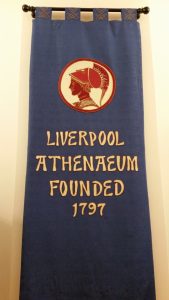The Liverpool Athenaeum - Shareholders and Slavery

Liverpool Black History Research Group (LBHRG) is sharing the Phase 1 findings of its investigation into the business activities of the founding proprietors of Liverpool’s Athenaeum. The Athenaeum was established in 1797 and is the only surviving private members club in the City. It preceded London’s Athenaeum and Garrick Club being achieved through proprietors buying individual shares at an initial cost of ten guineas.
In 2023, the club was at the centre of racism allegations against a member with the governing committee’s response to the issue being reported in the digital publication, ‘The Post’.
The purpose of the research project is to interrogate the business activities of the first 250 shareholders and to identify those with an interest in the slave economy. The project is split into two phases. The first phase, which has taken two years to complete, identifies those with a direct connection to the slave trade such as: captains, investors in slave voyages, plantation owners and slave factors/agents who acted as brokers for enslaved people. This phase also identifies a significant number of other members who are the direct descendants of slave traders and therefore may have received legacies/ benefits from wealth accrued through the slave trade. The second phase will focus on those additional shareholders with an indirect connection either through the importation of slave produced goods, or by supplying items used in the trade.
The findings build on the knowledge gained from LBHRG’s previous project ‘Enslavement Enabling Education’ investigating the founding members of Liverpool’s Royal Institution established in 1817, as a forerunner of the University of Liverpool.
The key findings are as follows.
- Although shareholders include the clergy and professional classes such as doctors and attorneys, the vast majority are referred to as merchants, esquire, or gentlemen.
- Although most identified as having a direct interest are known as merchants, some from the professional classes were also directly involved in the slave trade.
- 90 (or 36%) of shareholders have been identified with a direct connection to the slave trade. This includes shareholders from the city’s slave trading elite, for example, the Aspinall, Earle, Gregson, Heywood and Hodgson families, together with plantation owners, the Gladstones.
- Of these, 57 were established in the slave trade when joining the Athenaeum with 33 starting in the trade after
- A further 37 (or 14.8%) of shareholders have been identified as the direct descendants of slave traders
- Of the 22 officers forming its first committee 11 had direct connections to the slave trade with a further 2 being the direct descendants of slave traders.
- The first president, George Case, was one of the city’s most prolific slave traders. The original Athenaeum was built on land he had owned adjacent to his house on Church Street.
- Of those with direct slave trade connections or the descendants, 14 held the post of Mayor of Liverpool.
It is stressed that these figures represent a least case scenario, and may increase as the project continues. To date, a further 7 individuals have been discounted due to others sharing the same name, making identification problematic.
It is acknowledged that the shareholders do include a small number who held abolitionist sympathies, including one of its founders and second president, William Roscoe, who lobbied for abolition as MP for Liverpool in 1806-07. However, their number is far outweighed by those with an interest in maintaining the trade. Shareholders such as Reverend John Yates have also been identified who expressed abolitionist views while maintaining business interests in the slave economy.
The Athenaeum’s website is silent on these facts and indeed states;
‘Early proprietors played a major role in the national movement to abolish slavery’
These findings clearly demonstrate that this is a misleading narrative.
Our findings were reported locally in the Liverpool Echo and nationally in the Morning Star